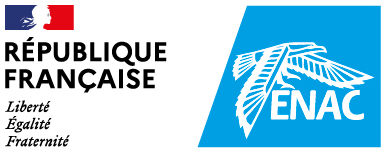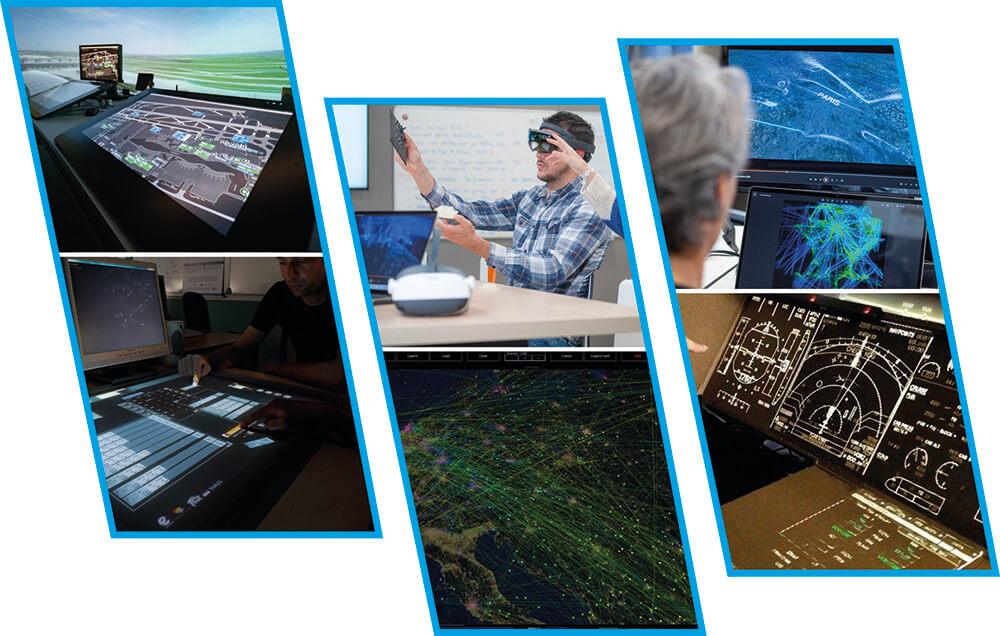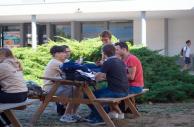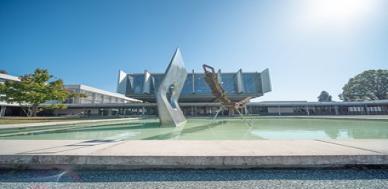The ENAC Research Lab
The air transport system is one which is spread over a global scale, with the task of accomplishing critical missions users’ integrity, as well as having to manage performance constraints (delays, capacity, safety, costs...). It involves a great diversity of operators (pilots, air traffic controllers, schedulers, airport operators, supervisors, maintenance engineers...) and stakeholders (airlines, air navigation service providers, airports, manufacturers...). As such, it constitutes one of the most complex systems ever conceived by humans.
Master the safety of this system while improving its performance and service quality, in a context of rapidly increasing international air traffic, raises numerous scientific challenges which affect the evolution of air transport, and to which the ENAC lab bring solutions. The ENAC is characterised by a unique combination of scientific excellence, technical and operational expertise, as well as experimental means covering the Air Transport System as a whole.This unique advantage is what makes the ENAC one major player in European and international research in the domain of Air Transport Systems.
The issues of research involving air transport systems often play a pioneering role in the emerging needs of deployed complex systems for the public space (autonomous transport systems, surveillance systems, security control systems, robust and precise geo-localisation systems, visualisation of complex systems...). This characteristic leads to a large range of applicability for the research carried out by the ENAC.
Missions and objectives
In order to meet the important challenges of air transport, the ENAC conducts research and development:
To develop a world-class research center that works hand in hand with the DGAC - the French Civil Aviation Authority - to face the scientific and technical challenges at the heart of the new generation of Air Transport Systems
- To develop a research policy that aims at contributing to the national and European priorities
- To develop strong interactions between education and research in order to offer cutting edge training and research projects to our students and post-graduates
- To be a major figure in European and international research in the field of air transport systems
- To cover a broad range of innovations, from fundamental research to the design and deployment of new services in the operational environment
- To develop a global network of partners made up of major figures in academic and industrial research
- To contribute to the development and excellence of the research carried out at the aerospace campus of Toulouse
ENAC, a world leader in research and innovation
Innovate in the field of air transport is to be able to address complex, multidisciplinary, multidimensional issues. This requires leading expertise as well as a wide-ranging and varied skill set. The ENAC is a unique entity that can mobilise such a diverse range of academic excellence, technical and operational expertise in aeronautics and space and know-how in instructional design, all for the benefit of research and education.
Our strength is our ability to develop scientific expertise which is always in line with the major dilemmas and challenges of aeronautics and space thanks to our many first-rate international partners in academia, our solid involvement in the industrial world as well as in the implementation of the Single European Sky.
Top-notch research for top-level instruction
Research activity allows the ENAC to maintain excellence and a pioneering vision throughout the whole range of its training programme , while drawing on the latest scientific and technical advances. This position of leader in aeronautical research and education offers an exceptional access to rich and varied subjects for all of its students, instructors, and researchers. ENAC also provides numerous opportunities for dialogue with the most important international figures in aeronautical innovation.
Organisation
Three research teams who strive for scientific excellence:
- LII - Interactive Informatics Research Team
- TELECOM - Telecommunication Research Team
- OPTIM - Optimization Research Team
Four transverse research programs deal with problems operational issues for which the solutions demand a multidisciplinary approach:
- Sustainable Development
- Air transport safety and security
- Drone systems
- General Aviation and Helicopters
Two technical platforms of international scale open to the research community that constitute research and training tools both for and through research:
- ACHIL (A simulation plateform open to your research)
- DRONES (Think, Develop and experiment the future of UAV Systems)
Figures
- 1st research Lab in the area of ATM (Microsoft top academic ranking 2015-2020)
- More than 150 researchers
- 57 professors-researchers
- 83 PhD students
- 5 post-doctorants
- 25 research engineers
- 300 operational experts
- More than 30 national and international Research programs
- More than 20 partnership agreements with international laboratories, leaders in air transport - NTU (Singapore), Nanjing (China), Beihang (China), UNSW (Australia), RMIT (Australia), MIT, NASA (USA), ... and central actors in air transport (ADP, Airbus, Thales, Sopra-Steria)
- An operational fleet of 104 planes, 2 flying experimental laboratories, 8 aerodromes of which 2 are equipped for research, 2 3D, 360° control tower simulators, 40 approach simulation positions, 80 en-route simulation positions, 20 tower and airport control simulation positions, A320 flight simulator
ENAC's Research Department has been "ISO 9001" certified since 2016. This certification covers the process contributing to the implementation of scientific policy and the definition, implementation and management of research projects. This certification continues ENAC's commitment to excellence in its training and research.
*The Single European Sky (SES) initiative, launched in 2004, tackles the fragmentation of European airspace and aims at improving ATM performance from the safety, capacity, cost-efficiency and environmental perspectives. New technologies play a major role in achieving these goals. The Single European Sky ATM Research (SESAR) Project brings together the resources and expertise of civil and military stakeholders, with the EU institutions, to develop innovative technologies and ways of working to improve ATM performance. ENAC is a founding and active member of SESAR, highly involved in 13 different projects (ATC-TBO, ASTAIR, CICONIA, CODA, ECHO 2, EUREKA, GEESE, HYPERSOLVER, JARVIS, NETWORK TBO, SIGN-AIR, SMARTS, TRUSTY)









